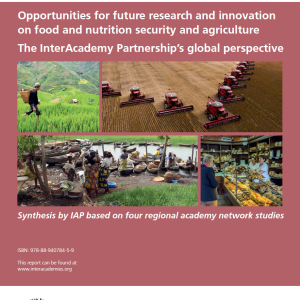
In this report, the InterAcademy Partnership expresses concern over the current state of global food systems and nutrition, and also identifies science-based initiatives that could contribute to solutions.
The report notes that agriculture, forestry and land-use change (excluding other stages of the food supply chain) cause 20 to 25% of global greenhouse gas emissions. The number of undernourished people is rising, it says, and progress on nutrition targets is threatened by climate extremes and variability.
The report calls for major changes to the food system, including:
- A shift to climate-smart food systems, although production-side emissions reductions will not be sufficient in themselves.
- Incentives for consumers to change their diets and reduce food waste.
- Innovative foods, such as meat–mushroom mixes, lab-grown meat, algae, and appealing insect-based foods.
- Stronger cooperation and collaboration between natural sciences, social sciences and policy.
- Creating an international advisory panel on food and nutrition security and agriculture.
Read the full report, Opportunities for future research and innovation on food and nutrition security and agriculture: The InterAcademy Partnership's global perspective, here. See also the Foodsource chapter Impacts of climatic and environmental change on food systems.












Post a new comment »